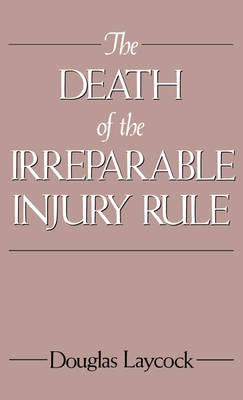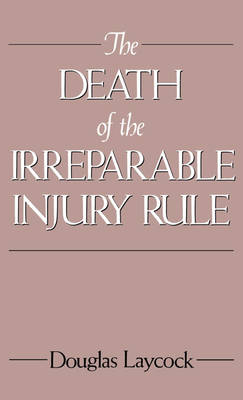
- Afhalen na 1 uur in een winkel met voorraad
- Gratis thuislevering in België vanaf € 30
- Ruim aanbod met 7 miljoen producten
- Afhalen na 1 uur in een winkel met voorraad
- Gratis thuislevering in België vanaf € 30
- Ruim aanbod met 7 miljoen producten
Zoeken
Omschrijving
The irreparable injury rule says that courts will not grant an equitable remedy to prevent harm if it would be adequate to let the harm happen and grant the legal remedy of money damages. After surveying more than 1400 cases, Laycock concludes that this ancient rule is dead--that it almost never affects the results of cases. When a court denies equitable relief, its real reasons are derived from the interests of defendants or the legal system, and not from the adequacy of the plaintiff's legal remedy. Laycock seeks to complete the assimilation of equity, showing that the law-equity distinction survives only as a proxy for other, more functional distinctions. Analyzing the real rules for choosing remedies in terms of these functional distinctions, he clarifies the entire law of remedies, from grand theory down to the practical details of specific cases. He shows that there is no positive law support for the most important applications of the legal-economic theory of efficient breach of contract. Included are extensive notes and a detailed table of cases arranged by jurisdiction.
Specificaties
Betrokkenen
- Auteur(s):
- Uitgeverij:
Inhoud
- Aantal bladzijden:
- 382
- Taal:
- Engels
Eigenschappen
- Productcode (EAN):
- 9780195063561
- Verschijningsdatum:
- 17/01/1991
- Uitvoering:
- Hardcover
- Formaat:
- Genaaid
- Afmetingen:
- 147 mm x 218 mm
- Gewicht:
- 566 g

Alleen bij Standaard Boekhandel
+ 627 punten op je klantenkaart van Standaard Boekhandel
Beoordelingen
We publiceren alleen reviews die voldoen aan de voorwaarden voor reviews. Bekijk onze voorwaarden voor reviews.











